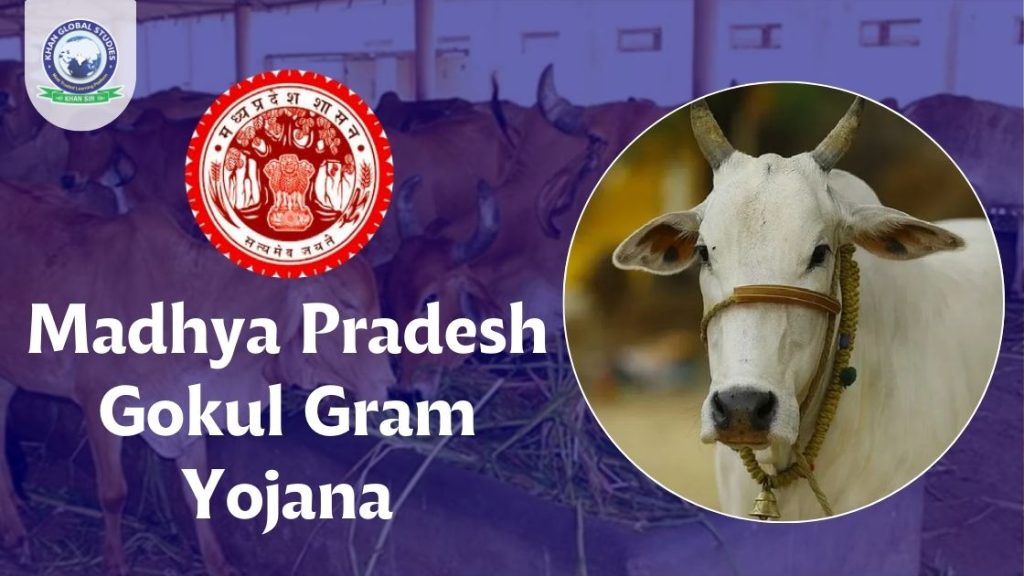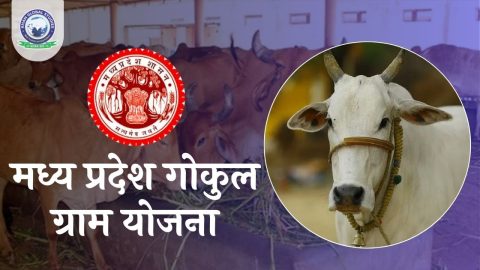Madhya Pradesh Gokul Gramin Yojana (MPGGY) is an ambitious initiative launched by the state government under the National Gokul Mission, aimed at preserving and promoting native breed cows, especially those of Indian origin. The scheme aims to address the declining population of native cows and their declining importance in the rural economy.
Main Objectives of MPGGY
- Promoting the Welfare of Cows: The scheme focuses on improving cows’ living conditions by setting up modern gaushalas (cow shelters), providing veterinary facilities and ensuring adequate pastures.
- Breed Improvement: To increase milk production and quality, MPGGY promotes the distribution of high-quality bulls, facilitates artificial insemination techniques and encourages livestock breeding programmes.
- Promoting Cow-based Economy: The scheme aims to promote cow-based activities such as milk production, setting up biogas plants and making organic manure.
- Expanding Employment Opportunities: MPGGY aims to create employment opportunities in animal husbandry, dairy processing and cow-based industries in rural areas.
- Promoting Environmental Conservation: Considering native cows as environmentally friendly, the scheme promotes the production of biogas and organic manure, reduces pollution and increases soil fertility.
Eligibility for MPGGY
- Small and marginal farmers are the primary beneficiaries of this scheme.
- Gaushalas and Gau Sanrakshan Samitis are also eligible to avail the benefits of this scheme.
Application Process
- Interested individuals can apply for MPGGY at their local Animal Husbandry Department.
- The application form needs to be submitted along with the required documents for the process.
Significance of MPGGY
MPGGY is an important step towards preserving and promoting native cows, especially the native breeds of India. The scheme aims to not only improve the livelihood of farmers but also contribute to environmental sustainability.
Moving Beyond Conservation: The Path to Revive Native Cows
MPGGY moves beyond mere conservation efforts by envisioning a comprehensive approach to revive the economic importance of native cows. Let us look at some of the key aspects of this approach:
- Focusing on Local Breeds: The scheme prioritises the conservation of endangered or neglected local cow breeds, such as Malvi, Gir and Sindhi. These breeds will be reared in suitable environments while preserving their unique characteristics.
- Modern Infrastructure: MPGGY envisages setting up state-of-the-art gaushalas equipped with comfortable living spaces for cows, automated feed distribution systems and veterinary care facilities. This will not only increase milk production but also improve the health of cows.
- Strengthening breeding programmes: To improve milk production capacity and quality, the scheme promotes the distribution of bulls with high genetic merit. Artificial insemination programmes will also be encouraged.
- Promoting Cow-based Industries: Apart from milk production, MPGGY aims to promote cow-based industries, including setting up of biogas plants, organic manure production, manufacturing of panchayat products and production of leather goods. This will not only increase the income of farmers but will also create employment opportunities in rural areas.
- Skill Development and Entrepreneurship: The scheme envisages training farmers in cow rearing, dairy management and production of cow-based products. This will enable farmers to become entrepreneurs and market their products effectively.
- Contribution to Environmental Protection: Native cows are considered to be eco-friendly animals. They emit less methane gas, and their dung can produce organic manure. The scheme aims to reduce the use of chemical fertilizers and increase soil fertility.
Challenges and Future Directions
While MPGGY has immense potential, certain challenges need to be addressed for its successful implementation. These include:
- Market Competition: Competing effectively with foreign-breed milk in the market and establishing a market for cow-based products will be important.
- Transparency and Accountability: Ensuring transparency in the implementation of the scheme and preventing corruption will be essential for its long-term success.
Expanding the Reach of the Scheme
In the future, MPGGY can be expanded to include women’s self-help groups, thereby empowering women and further strengthening their contribution to the rural economy.
Interesting Facts about Madhya Pradesh Gokul Gramin Yojana
MPGGY has some interesting aspects that go beyond its core objectives. Let us take a look at some of them:
- Livestock Insurance Scheme: A livestock insurance program can potentially be integrated into the scheme to make animal husbandry more attractive. This will provide financial security to farmers in case of an accident or illness of their cows.
- Marketing Support: Facilitating market access for milk and dung-based products is crucial for the success of the scheme. The government can provide marketing support to farmers. This can include branding these products and strengthening dairy cooperatives so that farmers can get better prices.
- Research and Development: Encouraging research and development activities specific to indigenous cow breeds can significantly improve their productivity and production. This will include adopting new technologies and implementing effective breed improvement programmes.
- Promotion of Tourism: MPGGY can potentially promote cow-based tourism. This will not only boost the rural economy but also increase awareness among people about the importance of indigenous cows. Tourists can visit gaushalas, learn about different breeds and see sustainable practices associated with cow rearing.
- Promotion of Organic Farming: The scheme can promote organic farming by advocating the use of cow dung manure and Gomutra (Cow Urine). This will help reduce the harmful effects of chemical-based agriculture and improve soil health, leading to increased crop yields and a more sustainable agricultural ecosystem.
Conclusion
The Madhya Pradesh Gokul Gramin Yojana is a good initiative that has the potential to make a significant impact on the lives of farmers, the environment, and the future of native cows in India. The success of this scheme depends on strong collaboration between the government, farmers, and NGOs. By effectively implementing the MPGGY and addressing existing challenges, India can move towards a more sustainable and cow-centric future.
Additional Information
- National Gokul Mission: https://dahd.nic.in/schemes/programmes/rashtriya_gokul_mission
- Madhya Pradesh Animal Husbandry Department: https://mpdah.gov.in/





